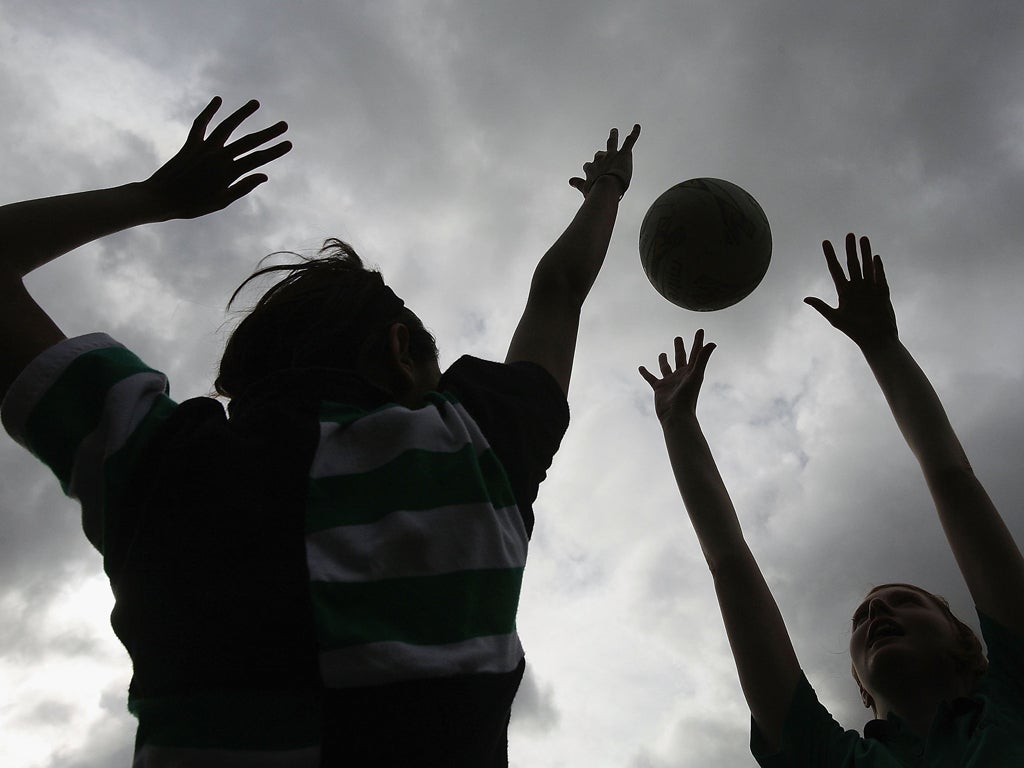PE in school: Actions would speak louder than words
Helping children grow up healthy is an essential part of education

Your support helps us to tell the story
From reproductive rights to climate change to Big Tech, The Independent is on the ground when the story is developing. Whether it's investigating the financials of Elon Musk's pro-Trump PAC or producing our latest documentary, 'The A Word', which shines a light on the American women fighting for reproductive rights, we know how important it is to parse out the facts from the messaging.
At such a critical moment in US history, we need reporters on the ground. Your donation allows us to keep sending journalists to speak to both sides of the story.
The Independent is trusted by Americans across the entire political spectrum. And unlike many other quality news outlets, we choose not to lock Americans out of our reporting and analysis with paywalls. We believe quality journalism should be available to everyone, paid for by those who can afford it.
Your support makes all the difference.There is far too much talking about activity in schools and not enough of the thing itself, an Ofsted report into physical education has concluded.
Its recommendation is entirely consistent with the problem. What is now needed is a follow-up report, comparing sport in state and private schools, and the publication of a new legacy strategy – more talk, in other words.
The question of whether children run around or loll about at school may seem a small matter but, beyond the pitch or gym, it brings together some rather important issues: obesity, competitiveness, national morale, the importance – or relative insignificance – of physical education.
Last year’s brave talk of a new approach to such things has turned out to be hot air. The Olympics, you will remember, were to be about the next generation. After our Olympic successes, the Prime Minister was said by Lord Coe to be “very seized by the need to leverage legacy from every nook and cranny of that project”. Seized he may have been, but precious little legacy has been leveraged so far. The Ofsted report reveals that the minority of schools play competitive sport at a serious level, commenting coolly that “the more able pupils were not challenged sufficiently because teachers’ expectations were too low”.
One of our Olympic heroes, Mo Farah, was making precisely that point last week as he set up a sports foundation in his name. The kind of grassroots PE that he received from primary school onwards is no longer available, he said, as a result of Michael Gove’s cuts to the school sports partnership scheme.
At the other end of the scale, children are getting fatter year by year but few schools, according to Ofsted, have PE programmes to specifically address the problem. There is, in fact, a waddling obesity of thought around the whole issue of sport for children. The left worries that if too much emphasis is put on winning then those who truly need exercise will be ignored. The right, muttering balefully against the prizes-for-all culture, demands more competition and speaks up for elitism.
Between them, they have lost sight of the fact that helping children to grow up healthy is an essential part of education. It requires thought, and a place in the curriculum. A regime that encourages the gifted to compete, and those who simply need exercise to do so in an enjoyable way, cannot be impossible to devise. It would an absurd waste of public money to compare sport in private and state schools, when the situation is entirely obvious. The independent sector spends money on sport and games because it believes quite rightly in the importance of exercise as part of growing up.
The other 93 per cent of our children desperately need the same level of seriousness to be taken towards PE in the state sector.
www.terenceblacker.com
Join our commenting forum
Join thought-provoking conversations, follow other Independent readers and see their replies
Comments